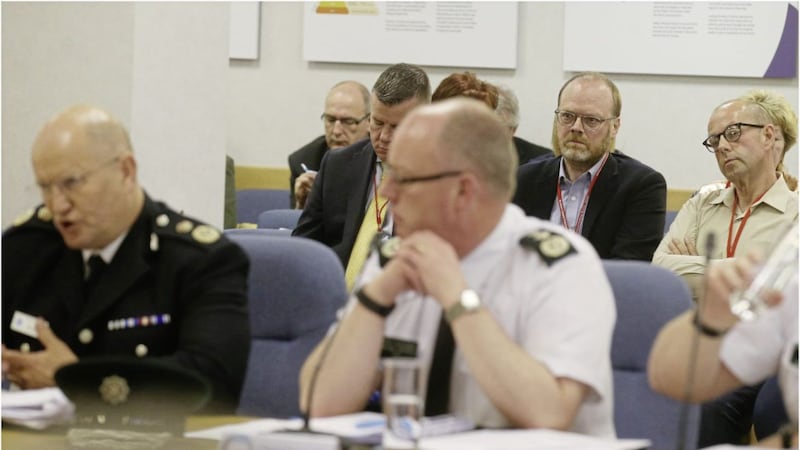The PSNI and Durham Constabulary do not seem to appreciate the gravity of their mistake in arresting journalists Trevor Birney and Barry McCaffrey. The PSNI says it concurs with Durham’s decision “not to progress the investigation into the two journalists”, following a judicial review Birney brought last week at his own expense. However, neither force has apologised or admitted fault and both continue to defend and progress the investigation into what they are still defiantly referring to as the “alleged theft or unlawful leaking” of documents from the Police Ombudsman’s office.
Last week, the most senior judges in Northern Ireland could not establish how anything being investigated even constituted a crime. Leaking is not theft and unlawful does not mean illegal. The case would certainly have collapsed had it come to a criminal trial, so suspicions of official malice and a fishing expedition are entirely warranted.
While freedom of the press and failure to solve the Loughinisland murders are the issues that have made headlines, those causes are collateral damage in whatever is going on between the PSNI and the Ombudsman’s office, which remains an enormous and dangerous issue all of its own.
**
US President Donald Trump has caused horror and hilarity by telling Taoiseach Leo Varadkar the post-Brexit border, which he compared to his wall with Mexico, will “not be a problem at all” as “good people” in Britain are working on it.
In a subsequent solo press conference, Varadkar said Trump did not have “an in-depth understanding” of the issues.
So which leader was the more undiplomatic?
Trump’s comments are not a million miles away from remarks two years ago by former Taoiseach Bertie Ahern, who said the border would be fudged by “throwing a blind eye to those areas that can’t come within technology”, adding “Theresa May - take her at her word.”
**
Stormont talks have not been a failure but locking in what progress has been made has caused discipline to slip. The assessment promised at the end of last month by the prime minister and the taoiseach was delivered by the tanaiste and - briefly - by the secretary of state. Another month of talks will now follow and the law permits them to continue until August before an election must be called. However, the DUP’s Paul Givan has said Stormont will not be restored by then, meaning slippage of that deadline is already being factored in. This can easily continue until Christmas.
**
Northern Ireland’s hospitality industry has learned to play political hardball, at least by the genteel standards of local business lobbying.
Earlier this year, a range of industry bodies objected to tweaking licensing legislation for the Portrush Open, saying it would set a precedent to give favoured events an advantage over pubs and clubs.
No event is more favoured than the world’s leading golf tournament. By objecting to the extension consultation, the industry put a serious spoke in the works.
Hospitality Ulster has now obtained a written guarantee from all five main parties to reform licensing hours if Stormont returns. The industry has accordingly withdrawn its objection to late opening for the Open.
**
It is that time of year again when satnav company TomTom releases its congestion report, which generally shows Belfast to have the worst traffic in the UK. However, the report is compiled by comparing rush-hour speeds with speeds throughout the rest of the day, so Belfast’s figures could be interpreted as showing the least congestion in the UK.
This year, Belfast moved three spots up from the bottom of the table, which means things are getting worse.
**
The Labour Party has been accused by the Tories of “state-sponsored theft” and “the policies of a banana republic with disregard for property rights” after commissioning an academic report on housing.
The report’s key recommendation is to replace Britain’s banded council tax with a “progressive property tax” based on individual capital values - in other words, to introduce the system used in Northern Ireland since 2007.
The rates are Stormont’s only serious taxation power, although so far that power has only been used to raise about 5 per cent of current spending.
If only we had a left-wing party with progressive policies that could make use of this radical instrument.
**
As schools here continue to threaten four-day weeks over budget shortfalls, a report by the Economic Policy Institute has thrown light on similar practices in America.
The report found four-day weeks, now common in half of US states, deliver savings of just 1.3 per cent, almost all due to not having to offer higher wages to recruit teachers. Those savings would not be available in Northern Ireland, where there is no teacher shortage and wages are centrally set.
The report also noted that to maintain teaching standards, most four-day weeks involve the same number of hours compressed into longer days.
The real purpose of four-day weeks in Northern Ireland would be to apply indirect political pressure by inconveniencing working parents.
Might four 9-5 schooldays actually appeal to working parents?
newton@irishnews.com









